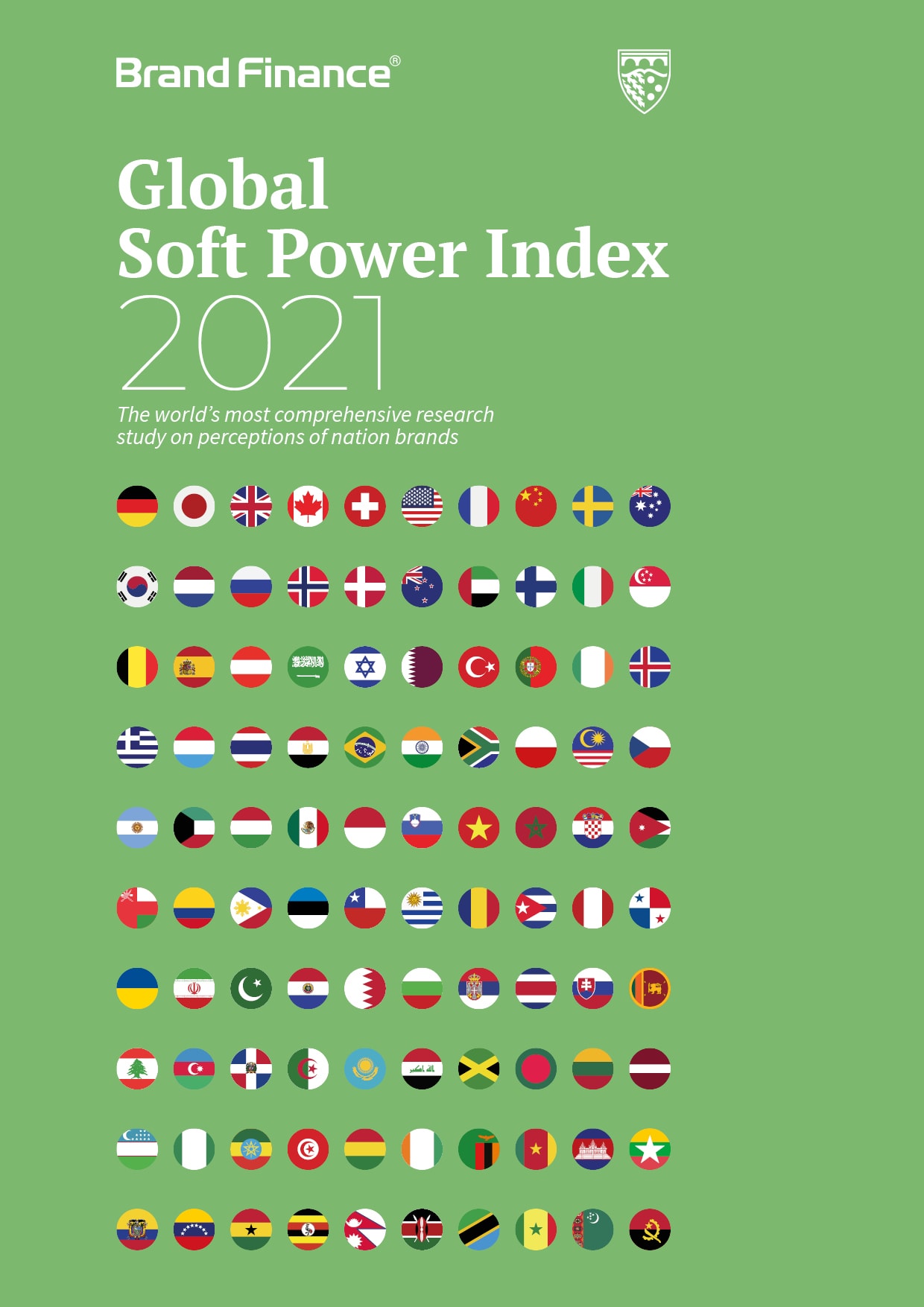This article was originally published in the Global Soft Power Index 2021 report and the Brand Finance Nation Brands 2021 report.
Italy has retained its position as the world’s 9th most valuable nation brand, posting a 12% increase to US$2.0 trillion. When looking at nation brand strength specifically, however, the nation has dropped from 28th to 32nd with a Brand Strength Index (BSI) score of 68.3 out of 100. Looking at BSI scores, Italy only increased 1.0 point year on year. In this respect the nation’s performance is stronger than that of the US, the UK, France, Japan, India, China and Germany, which are ranked higher, but have lost between 8.0 to 2.0 points.

During 2020, Italy’s scores slightly increased across the Familiarity, Overall Influence, Reputation, Business & Trade, Governance, International Relations, Media & Communications, and Education & Science metrics. The country’s drop in the BSI ranking is entirely due to the perception of the nation’s management of the pandemic. This perception is the result of bad luck, management errors, a large gap between expectations and results, and poor communication skills.
Italy was the first Western nation to see an outbreak of COVID-19, which brought worldwide attention and created mixed feelings towards Italians. Italy has been mocked and garnered a lot of criticism, but also strong empathy. However, the misfortune of being the first Western nation to suffer heavily from the effects of the virus and the emergence of serious organisational errors in the management of the pandemic led to unfavourable scores. The Italian nation brand, like that of other major nations, is perceived negatively overall as it did not live up to expectations with its pandemic response. It should be noted that Italy has one of the best health systems in the world and the first outbreak occurred in Lombardy, one of the most organised and richest areas in the entire continent of Europe.
Additionally, there is a chronic inability to effectively communicate the Italian brand image. The Italian government itself, aware of reputational issues, commissioned a communication campaign in June 2020 to relaunch Italy's image after the pandemic. Unfortunately, this was hampered by poor administrative efficiency which led to ineffective results. However, 2021 looks to be a great year for the Italian brand image. Prime Minister Draghi, who has a good reputation following his presidency of the ECB, is managing to effectively lead the Italian government. European partners and international heads of state express great respect for Mr. Draghi. In addition to what is called the "Draghi effect", a number of firsts have been achieved that have contributed to the good image of Italy in the world. The victory of the Italian football team at Euro 2020 and the success of the rock group Manneskin who, after winning Eurovision 2021, began to climb the charts around the world are the two most notable.
The good performance of the the Italian image in 2021 will be captured in the survey that Brand Finance will shortly be conducting for the Global Soft Power Index and Nation Brand 2022 rankings. In the meantime, we hope that the Italian government will take full advantage of this good period to better communicate the country's brand image
Interview with Nicola Bertinelli

What effect does Italy’s reputation for delicious food, high quality products, and rich heritage, have on Parmigiano Reggiano as a popular cheese worldwide?
I think there is a symbiotic relationship between the reputation of Made in Italy and Parmigiano Reggiano. Made in Italy means excellence, tradition, and an everlasting bond with a specific territory that is the Belpaese.
Similaraly, Parmigiano Reggiano has always been an expression of its land of origin. Monks were the first producers of Parmigiano Reggiano, driven by the quest for a cheese featuring one main characteristic: to last for a long time. This feature has been Parmigiano Reggiano's fortune, resulting in it travelling around the world for centuries to become an authentic expression of what we call today the Made in Italy agribusiness.
Parmigiano Reggiano is undoubtedly a traditional food but also one that is projected towards the future. It is an authentic precursor of current health trends thanks to its intrinsic qualities - naturally rich in nutrients and totally free from preservatives. What we call Made in Italy is the sum of many qualities and each one is represented by a product, a craftmanship, a tradition. Parmigiano Reggiano is simply all of this and is therefore inextricably linked to Made in Italy. They nourish each other.

What role does having a Geographical Indication play in Parmigiano Reggiano’s brand building and your reputation among key stakeholders?
Parmigiano Reggiano is a cheese with Protected Designation of Origin (PDO) status, i.e. a product that, based on its distinctive characteristics and its tie to the area of origin, is safeguarded by a system provided by the EU to protect consumers and producers alike. The EU’s PDO symbols on Parmigiano Reggiano packaging provide consumers with clear and concise information about its origin and authentic, high-quality production processes. The PDO system also benefits the rural economy by boosting farmers' income and creating incentive for people to live in more remote areas.
Thanks to its PDO status, Parmigiano Reggiano is protected against: any misuse, imitation, or evocation; any other false or misleading information about the provenance, origin, nature, or essential qualities of the product; any other practice likely to mislead the consumer about the product’s true origin; and commercial use of a registered name by products not covered by the registration if they are comparable to the authentic product or if their use exploits the reputation of the protected name.
As established in 2008 by the European Court of Justice, only Parmigiano Reggiano PDO cheese can be sold under the "Parmesan" denomination in Europe. This historic regulation not only protects PDO producers, but also consumers, who are guaranteed authenticity and traceability by being protected from misleading names in the market. Unfortunately, the laws that classify and protect Parmigiano Reggiano within the European Union are not globally observed, as both Parmigiano Reggiano and “parmesan” can coexist on the same shelf in some countries outside the EU. These products are often mistaken for authentic PDO products by consumers.
With Italy being severely hit by the pandemic at the beginning of 2020, how has the Italian government and Italian brands, such as yours, overcome these difficulties in order to prepare for the new normal?
The pandemic has not disrupted the activities of the Consortium. We immediately geared up to continue our quality controls in order to continue safeguarding and protecting consumers. We also continued our control activities on the markets with a special focus on protection at the international level.
In addition, the market has rewarded us during this period of crisis and uncertainty. Data has shown that our strong brand and solid positioning with consumers has acted as the best antidote to curb the commercial impacts of Covid-19. We now need everyone’s contribution to protect the product and prevent the risks associated with an extremely uncertain autumn both in Italy and abroad.
Parmigiano Reggiano closed the first half of 2021 with exceptional results, with a volume sales increase of 12.5% compared to the pre-pandemic period – 17,239 tons against 15,330 in 2019. This is an extraordinary achievement, taking into consideration both the pandemic’s impact on consumers’ spending capacity, and, subsequently the supermarket trolley, but also all the other threats coming from abroad: Brexit, the former US duties, and the “Italian Sounding” phenomenon that feeds a 2 billion euro parallel market.


